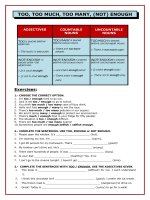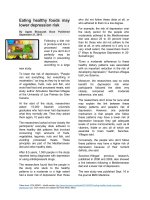islcollective worksheets preintermediate a2 adults high school reading passive voice or active voice technology clt comm 166497404255216b00a7bdb2 93143649
Bạn đang xem bản rút gọn của tài liệu. Xem và tải ngay bản đầy đủ của tài liệu tại đây (1.04 MB, 5 trang )
Our lives
(1)
_____________________________ (make) better every day thanks to
inventions. But sometimes, inventions can make our lives worse. This can happen when an
invention
(2)
__________________________ (not use) according to the inventor’s plan.
For example, Alfred Nobel, a Swedish scientist, invented a strong explosive in 1867. It
(3)
________________________ (call) dynamite and it revolutionized the world of engineering. After
its invention, many bridges, tunnels and other structures
with the help of dynamite. However, dynamite
(5)
_________________________ (build)
(4)
_________________________ (also, use) to kill
people in wars. This upset Nobel. Before his death, Nobel decided to use the money from his famous
invention
to
make
the
world
a
better
place.
A
special
fund
________________________ (start) in Nobel’s name. Every year, Nobel prizes
(6)
(7)
_________________________ (give) for extraordinary work in science, medicine,
literature and the promotion of world peace.
People usually think that rice
(1)
________________________ (grow) in
China.
But did you know that there’s a place in Spain full of rice fields?
They
(2)
____________________________ (locate) in north-eastern Spain on the
banks of the Ebro Delta at the Riet Vell nature reserve. 300 tonnes of rice
(5)
(3)
____________________________ (produce) each year. The first rice
(4)
____________________________ (plant) here in 2003. Chemicals
____________________________ (not use) in the fields before 2003 so the rice is
organic. Lots of birds
(6)
________________________________ (help) by the rice fields, including
herons and flamingos. The rice
(7)
including Germany. In 2004 the rice
_____________________________ (buy) by many countries,
(8)
________________________________( give) an organic food
award.
add dry introduce invent mix not make not need produce use (x2)
Paper
(2)
(1)
________________________________
from wood. The fibres of wood from trees
_________________________________ with water until they becomes a soft wet pulp, which
___________________________.
(3)
This
method
of
paper-making
(4)
_____________________________ in the 2nd century BC in China. However, early writing material
(5)
______________________________ (always) from wood. In fact, the word paper comes from
papyrus plants which
(6)
_________________________ by the Egyptians to
make a form of paper in 3,000 B.C.
When machines for-paper making
(7)
_____________________________ in the 19th century, paper became easy to
afford. Today, one of the problems with the huge production of paper is that a chemical called chlorine
____________________________ to make the paper white. Recycling is important, because
(8)
chlorine
(9)
__________________________
and
less
energy
(10)
____________________________ for recycled paper.
For centuries, people had local games where teams competed with a ball, but
the rules of our modern game of football
(not
write)
until
1863
in
(1)
______________________________
England.
Today
this
exciting
and
skilful
sport
(2)
__________________________ (enjoy) all over the world. Every four years thirty-two countries
(3)
_________________________ (allow) to compete in the World Cup. The 2015 World Cup
(4)
(hold)
____________________________
in
Brazil,
and
the
matches
(5)
_____________________________ (watch) by a TV audience of over thirty billion people. The
sport
(6)
___________________________ (not play) only by men. Women’s football is quickly
becoming more popular. The first Women’s World Cup took place in 1991 in China, where the
competition
(7)
____________________________ (win) by a team from the United States.
Who doesn’t like sweets? Sweets (1) ____________________________ (love) by
people everywhere – and not only by children. At our house, a sweet dessert
(2)
______________________________ (enjoy) by the whole family after every
meal. My favourite dessert (3) _____________________________ (invent) many
years ago – by mistake!
One day in 1905, a drink (4) ___________________________ (leave) outside by an
eleven-year old boy named Frank Epperson. The drink had a mixing stick in it. It was very cold that
(5)
night
and
the
drink
froze.
When
the
frozen
drink
_____________________________ (take) out of the cup, it stayed on the stick.
(6)
That’s how the first ice lolly
____________________________________ (create). Of course, ice lollies
(7)
__________________________________ (not sell) in shops immediately. After
all, their inventor was only a boy! But eighteen years later, Frank Epperson opened an
ice lolly factory.
Today, millions of his sweets creations (8) ________________________ (eat) worldwide.
give
kill
make
need
not protect
not understand
Disease is one of man’s greatest enemies. Between 1347 and 1351, about 25
million people in Europe
(1)
_______________________________ by the Black
Death. Before vaccines, people
disease. The first vaccine
1800, but the theory
(4)
(3)
(2)
__________________________ from
________________________________ in about
________________________________ for another
50 years. Today, vaccines
(5)
____________________________ to most
children in developed world, but more vaccines
___________________________________ in poorer countries.
(6)
buy
invent
The earliest books
copies
(2)
(1)
make
not teach
write
___________________________ by hand. This took a long time, so very few
______________________________. They
(3)
_____________________________ only by rich and important people. Ordinary people
(4)
_____________________________ to read. The printing press
(5)
_______________________________ in 1450 by Johann Gutenberg. He printed copies of the
Bible.
In
the
modern
world,
millions
of
books,
magazines
and
newspapers
(6)
______________________________ every day.
/>
Our lives
(1)
_____________________________ (make) better every day thanks to
inventions. But sometimes, inventions can make our lives worse. This can happen when an
invention
(2)
__________________________ (not use) according to the inventor’s plan.
For example, Alfred Nobel, a Swedish scientist, invented a strong explosive in 1867. It
(3)
________________________ (call) dynamite and it revolutionized the world of engineering. After
its invention, many bridges, tunnels and other structures
with the help of dynamite. However, dynamite
(5)
(4)
_________________________ (build)
_________________________ (also, use) to kill
people in wars. This upset Nobel. Before his death, Nobel decided to use the money from his famous
invention
to
make
the
world
a
better
place.
A
special
fund
________________________ (start) in Nobel’s name. Every year, Nobel prizes
(6)
(7)
_________________________ (give) for extraordinary work in science, medicine,
literature and the promotion of world peace.
People usually think that rice
(1)
_____________________ (grow) in China.
But did you know that there’s a place in Spain full of rice fields?
They
(2)
____________________________ (locate) in north-eastern Spain on the
banks of the Ebro Delta at the Riet Vell nature reserve. 300 tonnes of rice
(5)
(3)
____________________________ (produce) each year. The first rice
(4)
____________________________ (plant) here in 2003. Chemicals
____________________________ (not use) in the fields before 2003 so the rice is
organic. Lots of birds
(6)
________________________________ (help) by the rice fields, including
herons and flamingos. The rice
(7)
including Germany. In 2004 the rice
_____________________________ (buy) by many countries,
(8)
________________________________( give) an organic food
award.
add dry introduce invent mix not make not need produce use (x2)
Paper
(2)
(1)
________________________________
from wood. The fibres of wood from trees
_________________________________ with water until they becomes a soft wet pulp, which
___________________________.
This
(3)
method
of
paper-making
(4)
_____________________________ in the 2nd century BC in China. However, early writing material
(5)
______________________________ (always) from wood. In fact, the word paper comes from
papyrus plants which
_________________________ by the Egyptians to
(6)
make a form of paper in 3,000 B.C.
When machines for-paper making
(7)
_____________________________ in the 19th century, paper became easy to
afford. Today, one of the problems with the huge production of paper is that a
chemical called chlorine
paper
white.
(8)
____________________________ to make the
Recycling
is
__________________________
important,
and
because
chlorine
less
energy
(9)
(10)
____________________________ for recycled paper.
For centuries, people had local games where teams competed with a ball, but
the rules of our modern game of football
(not
write)
until
1863
in
(1)
England.
______________________________
Today
this
exciting
and
skilful
sport
(2)
__________________________ (enjoy) all over the world. Every four years thirty-two countries
(3)
_________________________ (allow) to compete in the World Cup. The 2015 World Cup
(4)
_________________________
(hold)
in
Brazil,
and
the
matches
(5)
_____________________________ (watch) by a TV audience of over thirty billion people. The
sport
(6)
___________________________ (not play) only by men. Women’s football is quickly
becoming more popular. The first Women’s World Cup took place in 1991 in China, where the
competition
(7)
____________________________ (win) by a team from the United States.
Who doesn’t like sweets? Sweets (1) ____________________________ (love) by
people everywhere – and not only by children. At our house, a sweet dessert
(2)
______________________________ (enjoy) by the whole family after every
meal. My favourite dessert (3) _____________________________ (invent) many
years ago – by mistake!
One day in 1905, a drink (4) ___________________________ (leave) outside by an
eleven-year old boy named Frank Epperson. The drink had a mixing stick in it. It was very cold that
(5)
night
and
the
drink
froze.
When
the
frozen
drink
_____________________________ (take) out of the cup, it stayed on the stick.
(6)
That’s how the first ice lolly
____________________________________ (create). Of course, ice lollies
(7)
__________________________________ (not sell) in shops immediately. After
all, their inventor was only a boy! But eighteen years later, Frank Epperson opened an
ice lolly factory.
Today, millions of his sweets creations (8) ________________________ (eat) worldwide.
give
kill
make
need
not protect
not understand
Disease is one of man’s greatest enemies. Between 1347 and 1351, about 25 million people in Europe
(1)
_______________________________
(2)
__________________________
by
the
from
Black
Death.
disease.
________________________________
in
about
________________________________
for
another
Before
The
1800,
50
vaccines,
first
but
years.
people
vaccine
the
Today,
theory
(4)
vaccines
(5)
____________________________ to most children in developed world, but more vaccines
___________________________________ in poorer countries.
buy
invent
The earliest books
(1)
not teach
write
___________________________ by hand. This took a
long time, so very few copies
(3)
make
(2)
______________________________. They
_____________________________ only by rich and important people.
Ordinary people
(4)
_____________________________ to read. The printing
press
(5)
_______________________________ in 1450 by Johann
Gutenberg. He printed copies of the Bible. In the modern world, millions of
books, magazines and newspapers
(6)
______________________________ every day.
(3)
(6)









